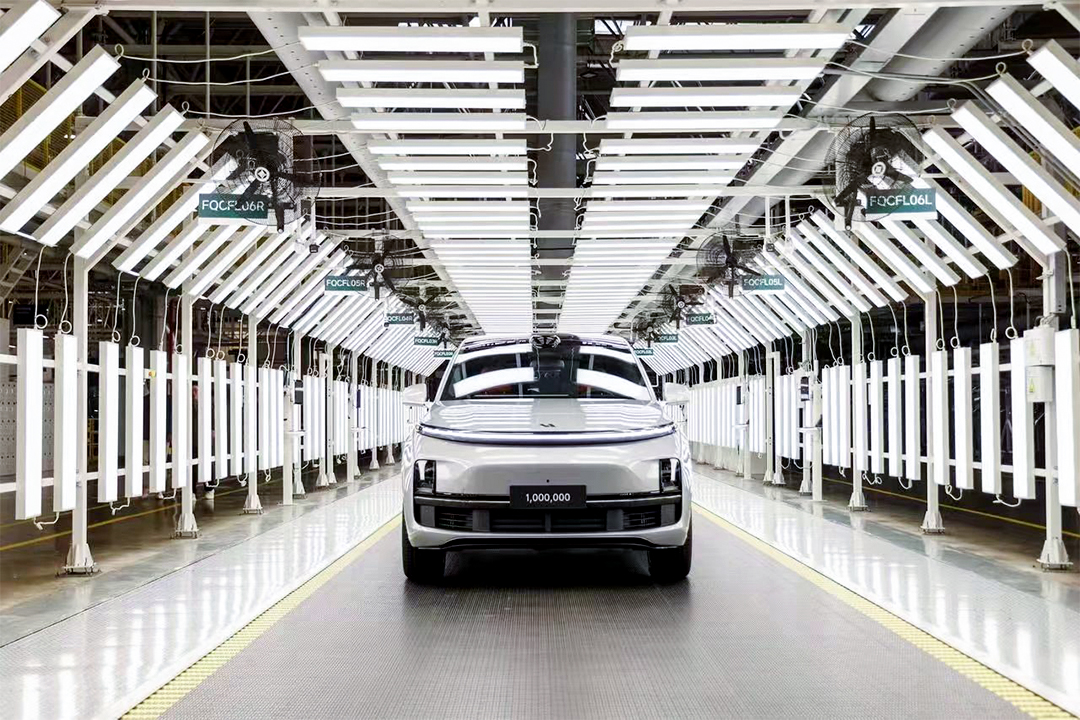 Li Auto Is China's First EV Startup to Hit Million-Car Mark, Powered by Growing Local Supply Chain
Li Auto Is China's First EV Startup to Hit Million-Car Mark, Powered by Growing Local Supply Chain(Yicai) Oct. 16 -- Li Auto has become the first Chinese new energy vehicle startup to produce one million cars, with the one-millionth vehicle rolling off the assembly line at its factory in Changzhou yesterday. Li Auto accomplished this feat due to the strong support of the local supply chain.
Li Auto’s L series sources around 60 percent of its components locally, and this is expected to reach 70 percent by 2026, further boosting the development of eastern Jiangsu province’s automotive industrial chain, said Li Xiang, chairman and chief executive officer of the Beijing-based carmaker.
The rise of China's supply chain is a key factor behind Li Auto's success. In the past, most Chinese auto parts companies mainly made non-core parts, such as tires, wheels and interiors. But in recent years there have been a number of breakthroughs, breaking the monopoly of foreign manufacturers.
Baolong Automotive, a supplier of air springs, started to mass produce single-chamber air springs in 2022, ending the reliance on imports from foreign producers such as Germany’s ZF Group. By this year it had migrated to dual-chamber air springs. This iteration speed is a big challenge for overseas manufacturers, Chairman and President Zhang Zuqiu said.
Baolong has now bagged a supply deal worth CNY240 million (USD33.7 million) from a well-known European automaker, the Shanghai-based auto parts maker said on Sept. 2. The firm will supply front and rear air springs for the air suspension system of a new platform. The project has a life cycle of seven years and mass production is expected to start in 2027.
Baolong is also in negotiations with the three German luxury car brands Mercedes-Benz, BMW and Audi, Zhang said. The Shanghai-based company will continue to expand production capacity, he said. It will set up factories in Europe and will link arms with Chinese original equipment manufacturers to go global.
Li Auto is also working closely with Chinese car braking systems manufacturer Bethel Automotive Safety Systems. Bethel took just 11 months to develop a wire control brake system from project approval to mass production.
"A Chinese factory can develop a new system in as little as 18 months, but it generally takes three years for foreign customers,” said Chairman and General Manager Yuan Yongbin.
Bethel has about 130 to 150 projects on the go, comparable with Germany’s Bosch, but Bethel’s output is smaller. Some of the Wuhu-based company’s projects have reached mass production and there are dozens of others still in development.
Local Investment
In 2020, Li Auto invested CNY400 million (USD56.2 million) in R&D and production at battery supplier Sunwoda. In April last year, Shenzhen-based Sunwoda established a Li Auto Business Unit with 1,300 employees.
In addition, Li Auto invested hundreds of millions of Chinese yuan, equivalent to tens of millions of US dollars, in R&D and production lines at motor manufacturer Inovance Automotive. It provided assistance in product definition, technology development, procurement and supply chain quality management.
Tie-ups with Li Auto, Xpeng, Xiaomi and other companies over the past two years have been crucial to Inovance's development, said Executive Vice President and Chief Operation Officer Yang Ruicheng.
"We were initially unable to access carmakers at home and abroad. But with the rise of Chinese car brands around 2019 and 2020 everyone began to learn from the startups. Then we tried to enter the traditional vehicle market again and found that the situation had improved a lot."
"In the past, the top 100 Chinese auto parts companies mainly made non-core parts, such as tires, wheels and interiors. I think there will be more core parts suppliers in China in the future," Yang said.
Editors: Zhang Yushuo, Kim Taylor